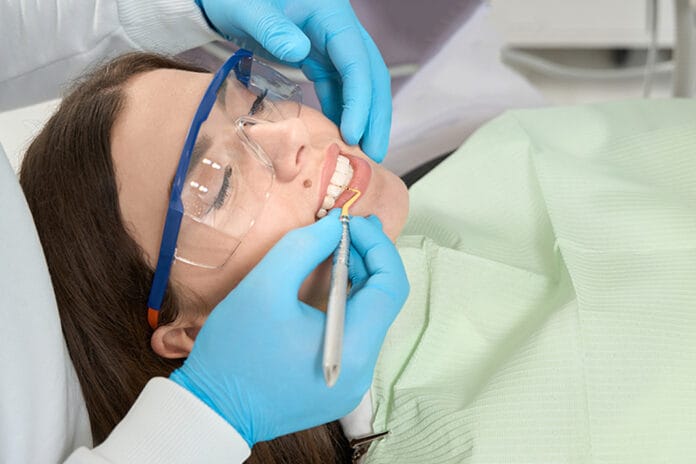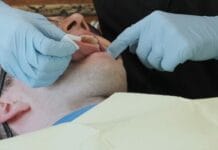Ever since I became a dental hygienist, friends and family have asked me the same question: “When are you going to go all the way and become a dentist?”
It’s nothing malicious. To them, it just seems like the next logical step. But for me, becoming a dentist was never something I considered. I know a few dental hygienists who have returned to school and become dentists, which is such a great achievement, and I’m so happy and proud of them.
But for me, dental hygiene is the finish line. Here are some reasons why I would rather be a hygienist than a dentist:
1) Passion for Prevention
I love working with my patients to prevent disease because it is so fulfilling to see patients who have improved their oral health based on the education and recommendations that I have given them. While hygienists do treat periodontal disease, we get to focus more on prevention than dentists do.
2) More Time with Patients
Hygienists often see one patient at a time, while dentists often bounce from one operatory to another. In a recall appointment, the patient only spends a few minutes with the dentist, while the hygienist is usually there for the entire appointment.
This allows hygienists to get to know their patients and build rapport. One of my favorite things about being a hygienist is talking with a diverse group of people. I love hearing about my patients’ lives, and I wouldn’t want to decrease my time with them.
3) Less Responsibility
Dental hygienists have a lot of responsibilities for which they are accountable. But I enjoy having a dentist I can consult with if there’s ever a decision I’m unsure about. So much of dentistry isn’t black and white, and there are a lot of judgment calls that need to be made.
I’m glad that the bulk of those tough decisions rests on someone else’s shoulders. I’m relieved that I don’t have to decide if we should prescribe opioids for pain management, for example. If a patient gets aggressive or unruly, I know I can leave the room and have the dentist handle that situation.
Also, I generally don’t have to bring work home with me. Dentists who own their practice have a lot of work outside of clinical duties. Dentists may delegate many business responsibilities, such as staffing, inventory, taxes, and payroll. Still, ultimately the business owner is responsible for all these things.
For example, if an employee quits or is on leave, the dentist may have to take on these tasks. Even if dentists don’t own a practice and practice as associates, they may have to put in some on-call time. A dentist must always be available in case a patient has an emergency. I’m glad I’m not the one who has to take those calls.
4) Dental School
I have a bachelor’s degree in dental hygiene. But this doesn’t mean I could apply straight to dental school. There are prerequisites for dental school, which usually aren’t satisfied with a dental hygiene degree. Very few dental students are graduates of dental hygiene school.1 Furthermore, dental school is very competitive, and completing the prerequisites doesn’t guarantee acceptance. Dental schools only accept about 53.5% of applicants.2 Even after being accepted into dental school, graduating and becoming a dentist isn’t guaranteed.
Those who complete dental school will have spent about four years in the program. The total cost ranges from $210,625 to $353,008.3 While dentists have high earning potential, I have no desire to put that kind of money and time into becoming a dentist.
5) Repetitive Motion Injuries
I have been a dental hygienist for 12 years, and it has put a lot of strain on my musculoskeletal system. With my repetitive motion injuries, I don’t think I’m going to be able to stay in clinical practice until I retire. While becoming a dentist may change my daily motions a little, I think I need to look at career options outside of clinical hygiene.
6) A Variety of Other Career Options
Dental hygienists have many career opportunities besides becoming a dentist. I am using my dental hygiene background as I write this article. Beyond working clinically, hygienists can work in a variety of settings, such as education, research, public health, administration, and corporate sales and education.4 Hygienists can even take an entrepreneurial approach and own a mobile dental business (if your state allows), start a non-profit, or invent a dental product, for example.4 I know hygienists who have moved on to real estate, insurance, fighting fires, medical school, and owning a business outside dentistry.
Public health is a passion of mine, so I’m considering government work when I retire from clinical hygiene. The skills we have developed as hygienists can be applied to many different fields of employment.
In Closing
Dental school might be a goal of some hygienists, and I salute them. But for many hygienists, it’s not our future goal. And that’s perfectly fine because being a hygienist is a fulfilling career on its own. And if it’s time to move on from clinical hygiene, we have limitless other options.
Before you leave, check out the Today’s RDH self-study CE courses. All courses are peer-reviewed and non-sponsored to focus solely on pure education. Click here now.
Listen to the Today’s RDH Dental Hygiene Podcast Below:
References
- Dental Hygiene as a Pre-Dentistry Major (n.d.). The Ohio State University. https://dentistry.osu.edu/academics/programs/dental-hygiene-programs/dental-hygiene-pre-dentistry-major
- Dental School Acceptance Rates (2023). (2023, May 13). Inspira Advantage. https://www.inspiraadvantage.com/blog/dental-school-acceptance-rates
- How Much Does Dental School Cost? Average Dental Degree Tuition & Costs. (2023, March 28). College Ave Student Loans. https://www.collegeavestudentloans.com/blog/how-much-does-dental-school-cost-average-degree-tuition-costs
- Professional Roles of an RDH. (n.d.). American Dental Hygienists’ Association. https://www.adha.org/education-resources/become-a-dental-hygienist/dental-hygiene-programs/professional-roles-of-an-rdh/











